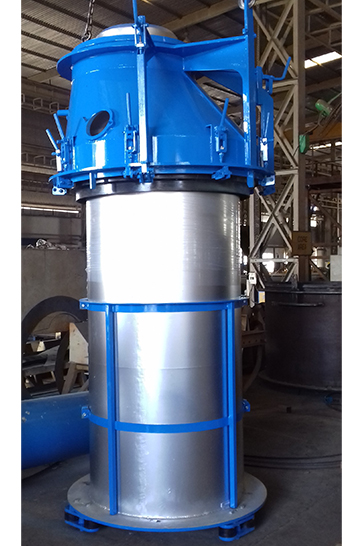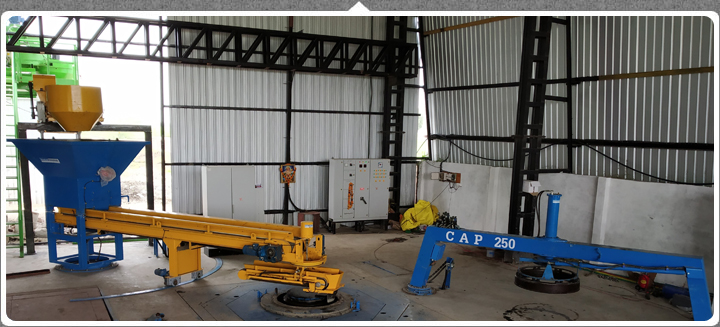
Essential Features of Mould Making Machines
The Concrete Pipe Making Machinesis at the heart of the concrete pipe making process. The moulds are manufactured from durable, high strength materials that resist corrosion and abrasion. The pipe moulds have internal and external cylinders such that the concrete materials are filled in between the two sections. Since concrete pipes come in various sizes; the diameter, length and internal shape is a replica of the product to be manufactured. The ends of the mould are also designed to allow for flush or rubber ring jointing.
The moulds are specially designed so that they can be closed and opened into two halves to enable easy removal of the final product. The locking mechanism can be manual or hydraulic.

Compaction is critical in achieving the required strength, appearance and making long lasting pipes. This is achieved through consolidation and compaction processes. Consolidation is done by vibration and removes honeycombs, voids and any trapped air. Through core and table vibration, pressure waves are generated and these shake the particles allowing better packing, bonding and removal of air. Table vibration is widely used in non conventional shapes such as square, rectangular and irregularly shaped culverts. Compaction is achieved through pressing at the top.
Pipe Mould Equipment
Advanced pipe mould equipment plays a critical role in the production process, ensuring that each mould is created with precision and durability. This equipment includes mould making machines, vibrators, and other essential tools that help to maintain uniformity and consistency across all moulds produced.
High-quality pipe mould equipment allows manufacturers to produce pipes in a variety of shapes and sizes, from standard circular pipes to more complex designs like box culverts or irregularly shaped pipes. Whether the application requires jacking pipes, lined pipes, or culvert pipes, having versatile and reliable equipment is key to ensuring that each pipe meets industry standards for strength, durability, and dimensional accuracy.
Investing in state-of-the-art pipe mould equipment not only improves production efficiency but also minimizes material wastage and reduces labor costs through automation.
Vertical Vibration Casting Process
This is the most advanced concrete moulding process. The process uses moulds that are mounted below the floor to reduce emissions and noise. Materials are added between the two moulds through a rotating and vibrating system. Compaction is then done before the material is removed.

This machine is suitable for high production of durable and reliable products. Jacking pipes, straight, box and irregular pipes can be manufactured easily. The machinery has easy automatic handling and loading, easy maintenance, achieve high quality smooth finish as well as high dimensional stability for diameter, length and weight.
Civil and Structural Standards in Concrete Pipes
Standards for pipes depend on the application, strength and pressure. Concrete pipe machine standards specify the dimensions and size; the allowable loading, maximum pressure, amount of fill for buried pipes, tolerances at the flush joints, internal finish, as well as installation. In terms of strength, they are rated as standard or reinforced pipes. Moulding machines are designed to manufacture various classes of pipes.
Fast and Reliable Installation Using Jacking Pipe Machinery
Pipe jacking is a modern cutting edge technology that allows pipes to be pushed through the tunnel as excavation continues. The pipe must be suitably moulded to impact high strength as it is thrust through the tunnel.
Moulds for Jacking Pipes
Jacking pipes require robust and specialized moulds to endure the high levels of pressure involved in pipe jacking processes. Moulds for jacking pipes are designed to meet strict structural and strength specifications, ensuring that the pipes can be pushed through tunnels and withstand the stresses of trenchless installation techniques. These moulds are typically reinforced and made with precision to create pipes that offer seamless installation without deformation or damage. High-quality concrete pipe making machinery, combined with state-of-the-art jacking pipe moulds, guarantees consistent and reliable products for long-term infrastructure projects.
Adding these moulds to your equipment lineup ensures you can meet the demands of modern underground construction projects with the necessary durability and accuracy.
Achieving High Production Using Culvert and Lined Pipe Moulds
Lined pipes are in most culverts, storm water and sewer lines to increase strength, prevent leakages and reduce corrosion. These pipes have inner steel of polythene lining. Specially designed moulds are available for easy, fast and economical casting of these pipes.
Moulds for Lined Pipes
In areas where water flow or chemical exposure is a concern, moulds for lined pipes are indispensable. Lined pipes incorporate a protective internal lining, often made of steel, polyethylene, or other materials, which helps prevent corrosion and improve the longevity of the pipe. These pipes are essential in applications such as sewage systems, stormwater drainage, and industrial fluid transport.
The moulds used for these pipes are specially designed to accommodate both the concrete outer structure and the internal lining, ensuring that the lining is applied seamlessly without affecting the pipe’s structural integrity. The pipe mould equipment used in this process must be precise to achieve a smooth and reliable finish, as imperfections could compromise the lining’s protective qualities.
By using specialized lined pipe moulds, manufacturers can create pipes that combine the strength of concrete with the durability of corrosion-resistant linings, offering a robust solution for a variety of challenging environments.
Manhole and Prebed Pipes Moulding Machinery
Pre-bed concrete pipes and well as specially shaped manhole pipes have unique shapes and strength requirement. Specially designed moulds are used to produce reliable, durable and high strength pipes.
Mould Making Machine: Enhancing Production Efficiency
A mould making machine is a pivotal component in any concrete pipe production facility. These machines are responsible for crafting the high-strength, durable moulds required for concrete pipe production. They are designed to produce moulds that are accurate and long-lasting, capable of enduring repeated use in high-pressure environments.
Modern mould making machines incorporate advanced technology, such as hydraulic locking systems and automated processes, to streamline the mould production process. These features ensure precision and uniformity in the creation of moulds, which in turn leads to more consistent and higher-quality concrete pipes. From standard pipes to more complex shapes like manholes and culverts, a reliable mould making machine is essential for producing a wide variety of concrete products.
Additionally, these machines reduce manual labor, increase production speed, and improve overall safety in the workplace by minimizing the need for manual mould handling. The efficiency and accuracy provided by a mould making machine are critical for manufacturers looking to enhance their production capabilities and meet increasing demand in the infrastructure sector.
Recent Articles
- Precast Concrete Box Culvert for Urban Underpasses and Cable Trenches
- How Concrete Pipe Machines Crucial in Power Plant Infrastructure?
- Role of Concrete Pipe Machines in Canal Lining Projects
- How Drycast Technology is Changing the Concrete Pipe Industry?
- Common Mistakes to Avoid When Selecting Pipe Moulds for Your Machine





 BACK TO ARTICLES
BACK TO ARTICLES